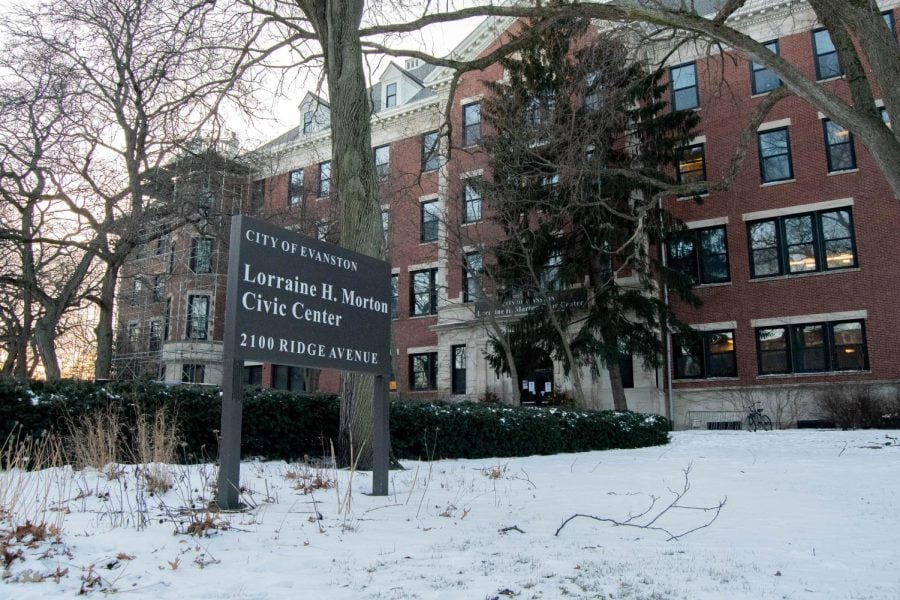Rapid Recap: City Council votes on hazard pay, vaccination requirements
Daily File Photo by Angeli Mittal
The Lorraine H. Morton Civic Center. City Council plans to restart its city manager search after a finalist dropped out for a position elsewhere.
January 25, 2022
City Council referred a motion to approve hazard pay for city essential workers to the Economic Development Committee Monday. The council also passed a resolution requiring all councilmembers be fully vaccinated or test negative for COVID-19 prior to future in-person meetings.
What context should I know here?
Ald. Devon Reid (8th) proposed a motion in May to provide retroactive hazard pay for essential workers. The proposal would require businesses with more than 500 employees nationwide to increase hourly pay for their Evanston workers. However, Reid said the motion was not passed due to low COVID-19 infection rates.
If the motion is passed, workers could expect to be compensated for some hours worked earlier in the pandemic.
Councilmembers still disagree as to whether the city has jurisdiction to impose hazard pay upon local businesses. But Reid noted other cities such as Seattle have passed similar hazard pay requirements.
What were the key points of debate?
Alds. Peter Braithwaite (2nd), Melissa Wynne (3rd) and Eleanor Revelle (7th) voted against the hazard pay motion.
Braithwaite said Evanston businesses are already under financial stress because of the pandemic. He said hazard pay could cause grocery stores to become less affordable.
“If the goal is to impact those that need the assistance, I would also challenge you to think about the residents who shop at these stores and rely on the affordable prices so they can support their families,” Braithwaite said.
The council also debated whether hazard pay should apply during all local and statewide emergencies, which Reid supported.
However, Wynne opposed this, saying it was “not good policy” to implement more comprehensive hazard pay after the motion had been tailored to the specifics of the pandemic.
What’s the expected impact of the vote?
The decision to reopen the discussion on hazard pay will move the proposal into the city’s Economic Development Committee, where members will talk with stakeholders about the potential impact on both Evanston businesses and workers.
What’s happening with council COVID-19 protocols?
Councilmembers unanimously agreed to instate official testing and vaccination requirements for City Council meetings.
Interim City Manager Kelley Gandurski noted the city already requires unvaccinated employees to test twice weekly. Monday’s vote will allow City Council meetings to take place in-person starting Feb. 14.
“The spirit behind implementing this rule is so that we all can meet in-person like we had been prior to omicron variant spikes,” Corporation Counsel Nicholas Cummings said.
Reid pushed for these requirements to be expanded to members of city boards, commissions and committees. The council ultimately agreed to move this discussion to the next meeting.
What should I look out for in the future?
The potential hazard pay ordinance is likely to reappear at a future City Council meeting following discussions with the Economic Development Committee.
The council also voted to discuss the possibility of offering KN95 masks to members of the public, council and Boards/Commissions/Committees members who attend in-person meetings. Councilmembers will also discuss an amendment to Monday’s vote that expands testing requirements to BCC members.
Email: [email protected]
Twitter: @lilylcarey
Email: [email protected]
Twitter: @luciabarnum_
Related Stories:
— Council votes to move forward on retroactive hazard pay for retail employees
— Housing and Community Development Committee discusses contract renewals, affordable housing
— City Council discusses “Living Rooms,” an alternative response to mental health crises


